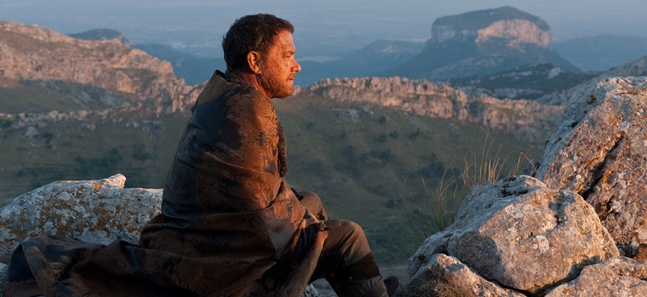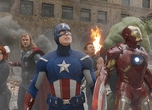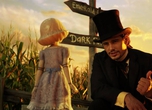Cloud Atlas: for and against
Time Out’s critics clash over the David Mitchell adaptation

© 2012 Warner Bros. Entertainment. All rights reserved.
Posted: Wed Mar 13 2013
For: ‘What’s not to love?’ asks Tom Huddleston
David Mitchell’s Booker-nominated 2004 novel Cloud Atlas was a zeitgeist-grabber, but it always seemed a touch self-important, eager to ‘transcend’ its genre elements – comedy, sci-fi, mystery – as though Mitchell’s ambitions were somehow more worthwhile than his sources. The movie version has no such pretensions: in the hands of Matrix directors the Wachowskis and Run Lola Run helmer Tom Tykwer, Cloud Atlas has become a technicolour explosion of a movie, an insanely ambitious, gorgeously realised and totally enthralling image-rush, which bounds from the sublime to the ridiculous and back again in the space of a heartbeat.
There are six stories here, spanning time (from 1849 to 2321) and distance (the Pacific islands to Edinburgh to ‘Neo Seoul’). The characters are linked only by a recurring comet-shaped birthmark, and the fact that they’re played by a revolving repertory company of familiar actors, led by Tom Hanks, Halle Berry and an impressive gaggle of notable British thesps.
This results in some of the most bizarre and borderline offensive casting choices in movie history: Hanks is terrific as an English doctor and an American scientist, but struggles as a rampaging Irish gangster-turned-author; Berry is perfect as a crusading Californian journalist but her appearance as a German-Jewish refugee is just creepy; Hugh Grant delivers the film’s juiciest turn as an oily power plant executive, but when he turns up as a tattooed futuristic cannibal warrior, the only appropriate response is laughter.
In a departure from the novel, all six stories are placed concurrently, and the result is a masterclass in cross-cutting. There’s not an ounce of fat here: each story has its own momentum, but thanks to a relentless series of cliffhangers and coincidences each tale also serves to drive the others forward, deepening the tension and resonance at every turn. The cumulative effect is unique and often breathtaking.
There are those who argue that Cloud Atlas is undisciplined, overambitious and very silly. All of this is true, but when in epic cinema have those qualities been a hindrance? This is a movie which cuts from spry comedy in an Edinburgh old folks’ home to an eyepopping flying car chase in futuristic Korea without breaking stride; a film which casts Hugo Weaving as a Nazi conductor, a bleach-blond contract killer, a big-breasted nurse and Old Greg from The Mighty Boosh; a film which piles on the action, the romance, the philosophical inquiry and the silly accents until the viewer is left punch-drunk and reeling. Seriously, what’s not to love?–Tom Huddleston
Against: Keith Uhlich finds it ‘thuddingly literal’
The thrill in reading David Mitchell’s eras-spanning, genre-hopping novel Cloud Atlas comes primarily from its stylistic showmanship: six stories set in respective time periods between 1850 and the far-distant future, with each tale authored in a different form – from airport-rack potboiler to solemn speculative fiction with its own invented dialect. Five of the yarns are interrupted midway through, only to be resolved in Russian-nesting-doll fashion after the sixth provides a reverberant narrative centre. The rather hoary themes of social oppression, the transmigration of souls (represented via a shared comet-shaped birthmark) and simple acts of kindness echoing through the ages are secondary to Mitchell’s mesmerising plate-spinning act. The author’s way with words – the sense that, beyond all the expert pastiche, you’re reading an ever-evolving history of human language – both demands and keeps your constant attention.
By contrast, the independently financed, passion-project film version from joint writer-directors Andy and Lana Wachowski (The Matrix) and Tom Tykwer (Run Lola Run) does little that engages your intellect or emotions. The book’s tales are translated faithfully, story beat by story beat: the 19th-century seafaring saga, ‘The Pacific Journal of Adam Ewing,’ with Jim Sturgess as a sickly diarist; 1930s-set melodrama ‘Letters from Zedelghem,’ featuring Ben Whishaw as a closeted composer; the ’70s paranoia-thriller-aping ‘Half-Lives: The First Luisa Rey Mystery,’ with Halle Berry as a nosy reporter; the present-day comic picaresque ‘The Ghastly Ordeal of Timothy Cavendish,’ with Jim Broadbent as a publisher on the run; the 22nd-century dystopian sci-fi ‘An Orison of Sonmi-451,’ with Doona Bae as a revolutionary Korean replicant; and the postapocalyptic aboriginal adventure ‘Sloosha’s Crossin’ an’ Ev’rythin’ After,’ with Tom Hanks as a cowardly goatherd.
Yet the language of cinema has its own demands, and the solutions the Cloud Atlas–obsessed trio came up with in translating Mitchell’s expansive tome to the screen are thuddingly literal. The stories are interwoven into a ceaselessly cross-cut tapestry that, rather than provide a sense of stakes-raising momentum, makes it feel as if we’re watching the longest, most laborious climax ever filmed. (A Tron-style motorcycle chase in the future is mashed up with nursing-home escape mischief in the present, then the whole thing collides with a soaring symphony-in-progress in the past, etc.) Plus, the decision to cast the starry company in multiple roles – the lead in one tale is an extra in another, and so on – never resonates in the intended fashion, since the performers are, with rare exceptions, buried under distracting pounds of makeup and prosthetics.
It would take a Peter Sellers or a Meryl Streep to find the connective tissue under all the features- and chromosome-altering latex. Instead, the Wachowskis and Tykwer put all their chips on poor, befuddled Hanks as the central soul around whom all the others revolve. His journey from a rotten-toothed poisoner in ‘Pacific Journal’ to a redemption-seeking tribesman in ‘Sloosha’s’ is meant to be the film’s emotional backbone. Yet Hanks never gets beyond dress-up gimmickry: at best he’s bland, at worst embarrassing (the actor’s thankfully brief appearance as a hotheaded, critic-murdering author in the ‘Cavendish’ section is the hide-your-head-in-shame nadir). The other actors are similarly hamstrung by all the pancake and powder; only Whishaw genuinely moves as the suicidal protagonist of ‘Zedelghem.’ But the spot-the-performer shenanigans at least provide a constant source of entertainment: Look! There’s Sturgess in yellowface! And Berry as a white Jewish trophy wife! Isn’t that Hugh Grant as a machete-wielding cannibal? It’s the part he was born to play, baby!
All mockery aside, what the Wachowskis and Tykwer are attempting is crystal clear – a kind of epic, equal-opportunity parable about the transgression-cum-transcendence of rigid societal norms. Yet you never sense, as you do with Mitchell’s prose, that the directors have a vital grasp of the varied genres, nor of the profound themes that can spring from even the basest forms of storytelling. Instead, these disparate tales have been listlessly smashed together in the hopes that something substantial will emerge. For all of Cloud Atlas’s pseudo-revolutionary blather about upending the ‘natural order,’ the execution couldn’t be squarer.–Keith Uhlich
Cloud Atlas opens nationwide on March 15
Tweets
- About Us |
- Work for Time Out |
- Send us info |
- Advertising |
- Mobile edition |
- Terms & Conditions |
- Privacy policy |
- Contact Us
Copyright © 2014 Time Out Tokyo














Add your comment